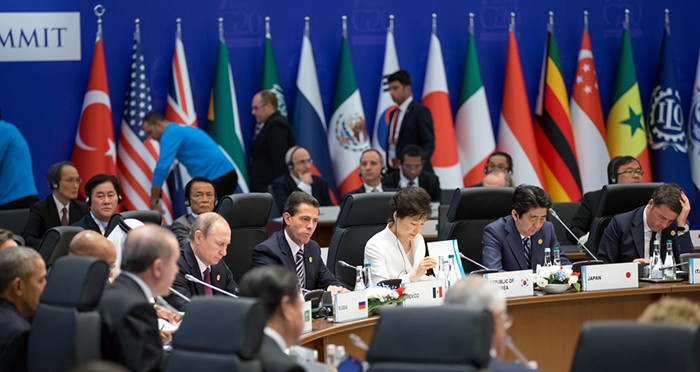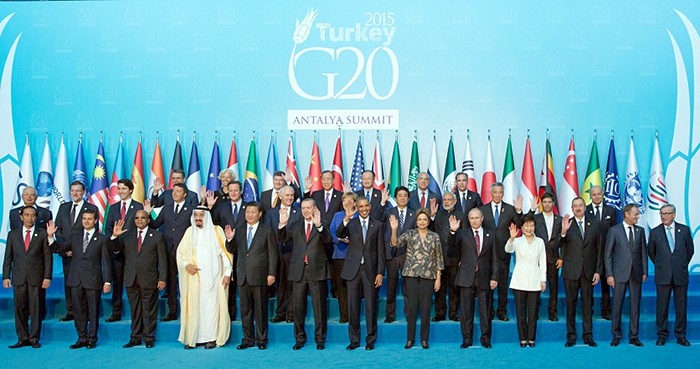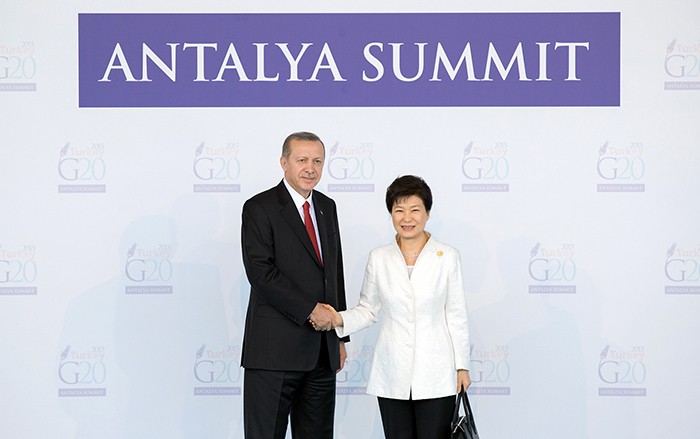

President Park Geun-hye and other G-20 leaders attend the G-20 summit in Antalya, Turkey, on Nov. 15.
President Park Geun-hye embarked on her two-day trip to Antalya, Turkey, on Nov. 15, as she met with her counterparts from other G-20 countries.
During a meeting over lunch, President Park and the G-20 leaders discussed ways to further cooperate with lower-income developing countries on a range of issues, including food security and the implementation of the Action Plan for Nutrition.
“As the 21st Climate Change Conference of the Parties (COP21) in Paris is just two weeks away, all eyes are focusing on a new deal to be set at the upcoming conference, a deal to combat climate change,” said President Park during the meeting.
“More than 160 countries from around the world, countries that account for 90 percent of the world’s greenhouse gas emissions, have expressed their determined will to support a successful launch and implementation of a new deal, as they have already submitted their Intended Nationally Determined Contributions (INDCs), showing their commitment to the deal.
“Korea, too, has joined the international effort,“ she continued, “and has laid out its own plan to cut greenhouse gas emissions.” The Korean government submitted its INDC in June 2015 in the United Nations Framework Convention on Climate Change (UNFCCC) report. Its aim is to cut its greenhouse gas emissions by 37 percent by 2030, or by about 850.8 million tons of carbon dioxide equivalents, an amount that Seoul would reach if it were to let business carry on as usual.”
President Park stressed that, “To successfully put the new climate change deal in place, we must shift the way in which we see the issue, not as a burden but as a new opportunity to create a new growth engine for the future.”
She also outlined Seoul’s efforts to get climate change under control, saying, “Seoul has been actively involved in fostering new energy industries based on four models designed for new renewable energy: an energy storage system (ESS), eco-friendly energy towns, electric cars and smart farms.”
“To keep global warming below two degrees Celsius, what’s crucial is both offering financial support to emerging economies and sharing related technologies with the countries,” the president added. “Korea works in cooperation with the Green Climate Fund (GCF) in an effort to share with such developing nations our accumulated skills and business models, applicable in new energy industries.”
The president also mentioned that Seoul had agreed with the GCF to join forces on the project to reduce greenhouse gases and to offer electricity around the clock at the same time at a fruit processing plant in Peru, by establishing a solar energy system and an ESS at the factory.
During her speech in the first session of the G-20 summit, President Park emphasized that, “A structural shake-up is vital for inclusive and robust growth.” She then explained the tangible results of reforms that Seoul has pursued in four key areas: the public sector, finance, education and the labor market.
“When such reforms are so important, it is like cultivating an arid field to make it fertile. It is no less important than what seeds we are going to plant in the land. Korea has worked to seek out new impetuses for economic growth by investing in the so-called ‘creative industries.’ We have created new jobs and supported startup businesses through the newly-opened Centers for a Creative Economy and Innovation set up across the nation.”
The president also called on the international community to come closer together and to invest more in infrastructure across Northeast Asia and also in North Korea, saying that, “If North Korea gives up its nuclear weapons ambitions and chooses a path toward openness and cooperation, we will work together with the global community to support infrastructure investment across Northeast Asia, an amount expected to be worth about USD 63 billion annually.”
Finally, she proposed that to achieve this goal, “This would be a good way to set up a differentiated Northeast Asian development bank across the region that would cooperate with the Asian Development Bank (ADB) and the Asian Infrastructure Investment Bank (AIIB), banks that have contributed to developing Asian countries.”
By Wi Tack-whan, Sohn JiAe
Korea.net Staff Writers
Photos: Cheong Wa Dae
whan23@korea.kr

President Park Geun-hye (fourth from right, front) and other G-20 leaders pose for a photo during the G-20 summit in Antalya, Turkey, on Nov. 15.

President Park Geun-hye (right) is greeted by her Turkish counterpart President Recep Erdoğan during the welcome ceremony at the G-20 Summit in Antalya, Turkey, on Nov. 15.























